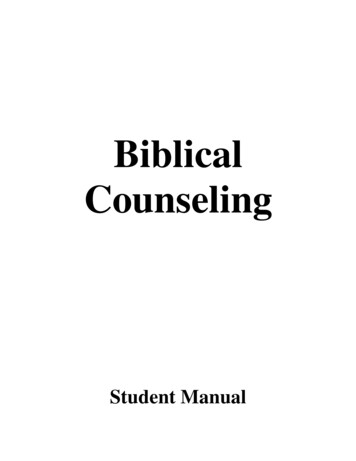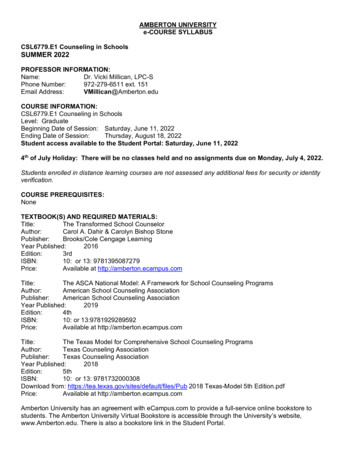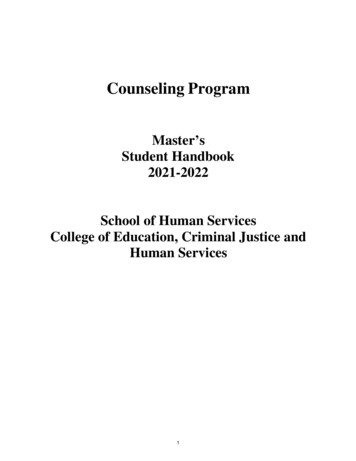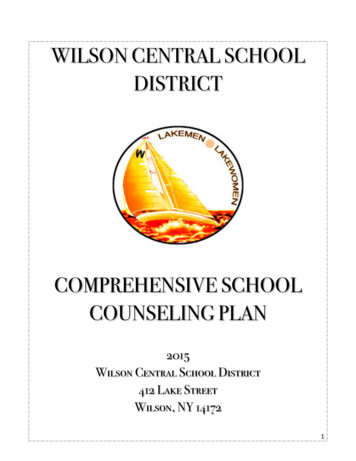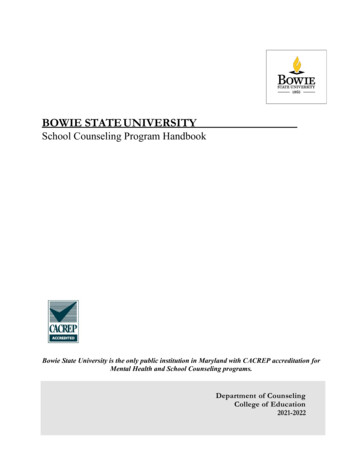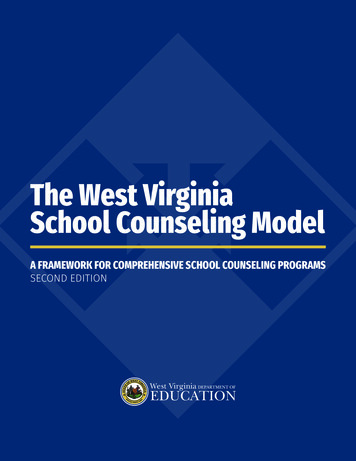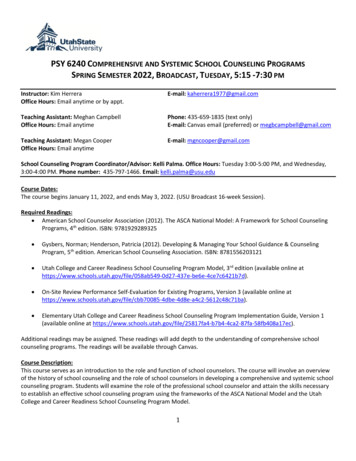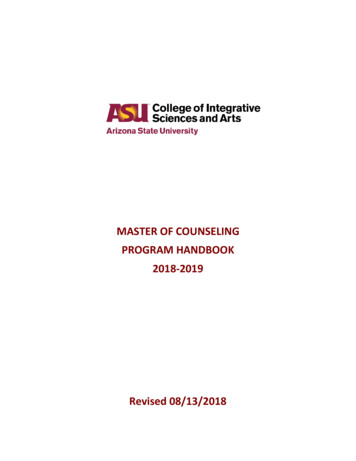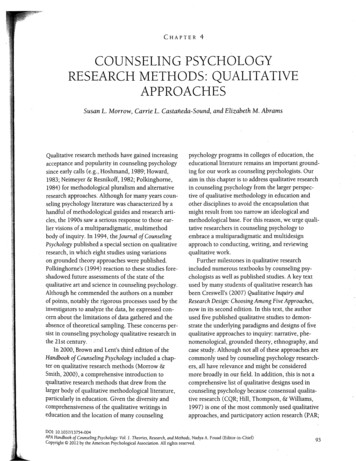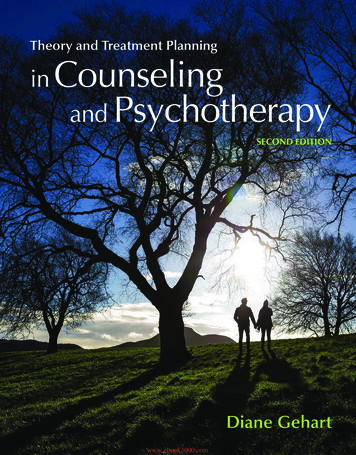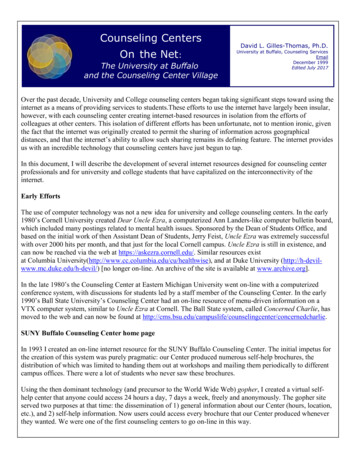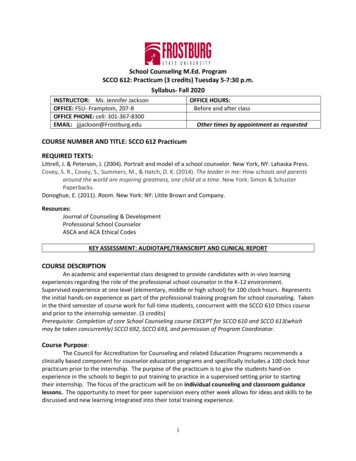
Transcription
School Counseling M.Ed. ProgramSCCO 612: Practicum (3 credits) Tuesday 5-7:30 p.m.Syllabus- Fall 2020INSTRUCTOR: Ms. Jennifer JacksonOFFICE: FSU- Framptom, 207-8OFFICE PHONE: cell: 301-367-8300EMAIL: jjjackson@Frostburg.eduOFFICE HOURS:Before and after classOther times by appointment as requestedCOURSE NUMBER AND TITLE: SCCO 612 PracticumREQUIRED TEXTS:Littrell, J. & Peterson, J. (2004). Portrait and model of a school counselor. New York, NY: Lahaska Press.Covey, S. R., Covey, S., Summers, M., & Hatch, D. K. (2014). The leader in me: How schools and parentsaround the world are inspiring greatness, one child at a time. New York: Simon & SchusterPaperbacks.Donoghue, E. (2011). Room. New York: NY: Little Brown and Company.Resources:Journal of Counseling & DevelopmentProfessional School CounselorASCA and ACA Ethical CodesKEY ASSESSMENT: AUDIOTAPE/TRANSCRIPT AND CLINICAL REPORTCOURSE DESCRIPTIONAn academic and experiential class designed to provide candidates with in-vivo learningexperiences regarding the role of the professional school counselor in the K-12 environment.Supervised experience at one level (elementary, middle or high school) for 100 clock hours. Representsthe initial hands-on experience as part of the professional training program for school counseling. Takenin the third semester of course work for full-time students, concurrent with the SCCO 610 Ethics courseand prior to the internship semester. (3 credits)Prerequisite: Completion of core School Counseling course EXCEPT for SCCO 610 and SCCO 613(whichmay be taken concurrently) SCCO 692, SCCO 693, and permission of Program Coordinator.Course Purpose:The Council for Accreditation for Counseling and related Education Programs recommends aclinically based component for counselor education programs and specifically includes a 100 clock hourpracticum prior to the internship. The purpose of the practicum is to give the students hand-onexperience in the schools to begin to put training to practice in a supervised setting prior to startingtheir internship. The focus of the practicum will be on individual counseling and classroom guidancelessons. The opportunity to meet for peer supervision every other week allows for ideas and skills to bediscussed and new learning integrated into their total training experience.1
Course OutcomesKnowledgeAssessmentsCFINTASC1. Responsibilities &duties of a schoolcounselor2. Psycho-social issuesat this particulardevelopmental level3. Appropriate ethicalguidelines4. School climatevariables which affectlearning5. Appropriate ethicalguidelines in allcounseling activities6. Classroommanagement strategies1. Reflective paperDP912. Reflective paperDP21,33. Evaluation, class discussionDP,RDM914. Environmentalanalysis/needs AssessmentDP,RDM3,91,5,25. Evaluation, class discussionDP,RDM91,56. Guidance lessons, guidanceunit, evaluationDP,RDM5,71,51. Conducting classroomguidance lessons1. Evaluation, guidance unitDP,RDM5,82. School climateassessment2. Environmentalanalysis/needs assessmentDP,RDM,EA2,31,2,53. Individual counseling3. Tape/transcription,evaluation4. Evaluation, class discussion3,5,91,2,5DP,RDM2,3,51,2,5Skills4. Working with diversepopulations and issuesMTTSIICACREP1,5DP,RDMDispositions1. Willingness to be a“team player” in theschool setting2. Openness tofeedback fromsupervisors3. Willingness toexamine personaldynamics as they enterthe practicum situation4. Willingness toconduct oneselfaccording to ACA &ASCA Codes of Ethics1. Evaluation, class discussionjournalDP,RDM101,52. Evaluation, review of tapeDP,RDM913. Reflective paper,evaluation,class discussionDP,RDM91DP,RDM91,54. Evaluation, journal, classDiscussion2
Practicum Field Experience DescriptionThe Council for Accreditation Counseling Related Education Programs (CACREP) recommends a clinicallybased component for counselor education programs and specifically includes a 100 clock-hourPracticum prior to the Internship. The Practicum is an academic and experiential class intentionallydesigned to provide candidates with practical hands-on learning experiences regarding the professionalschool counselor’s role in the K-12 environment putting training to practice.The Practicum is a supervised 100 clock-hour experience at one level (elementary, middle or highschool) through a full academic semester experience, representing the initial hands-on experience aspart of the professional training program for school counseling. The Practicum required 100 hourstranslates into a one-day per week or seven hours per week experience for the 15-week semester,dependent upon the Candidate’s needs.In a supervised setting, the focus of the practicum is on individual counseling and elementary classroomor secondary group guidance lessons. After a period of observation, the student’s experiences areguided by the School Supervisor to help create opportunities for the practicum student to complete atleast 40 clock hours of direct service with actual clients to develop counseling skills through individual orgroup counseling sessions. The student must teach a minimum of one guidance lesson observed by theUniversity Supervisor within the elementary classroom or secondary group/classroom setting. Audioand video recordings with permission forms are required and provided.The practicum students have individual supervision and daily interactions with their supervisorsthroughout the practicum. They also meet on campus for class with the University Supervisor to receivedirection, develop connections and learn information to support their total learning experiences.As part of the practicum experience, the School Supervisors conduct formative (mid-point) andsummative (end-point) evaluations of the practicum students’ counseling performance, professionaldisposition, and ability to integrate and apply knowledge. Forms are provided.University and School BreaksThe candidate follows the university calendar for Practicum. Practicum and Internship candidates willfollow their placement district’s calendar, (i.e., school start, Thanksgiving holiday, Spring Break ) in orderto ensure that the scheduled number of hours is met. Candidates enrolled at USMH will follow theschool calendar at WCPS, FCPS, or West Virginia County. Candidates may make special arrangementswhen differences exist between the university calendar and the school calendar, with permission fromthe Clinical Coordinator, the University Supervisor, and the on-site School Counselor Supervisor .Addressing Supervisor and School PersonnelCandidates should use the appropriate titles when addressing or referring to a supervisor, parents orother educators during the field experience, as a sign of respect, using the appropriate title (Mr. Miss,Ms., Mrs. or Dr.) and the individual’s last name. At all times when students are present, appropriatetitles and surnames should also be used when addressing parents, even if the candidate has a priorsocial relationship with the parent outside of the classroom. Any candidate questions regarding how toaddress individuals should be directed to the candidate’s on-site or university supervisor.3
EVALUATION:The final grade in this course is based in part on performance on the above course assignments.In addition to satisfactory completion of all assignments in a timely fashion, the practicum candidate willbe evaluated by the Site Supervisor twice using the Practicum Evaluation Form (mid-term and final), andthe University Supervisor with respect to professional conduct and adherence to the ACA and ASCAEthical Standards. A field observation will be scheduled during a 1:1 counseling experience, classroomlessons, or group session. It is incumbent upon the intern to provide dates and times available for thisexperience.Additionally, the following course activities must be completed: Attendance at all course meetingsActive participation in the counseling processCompletion of reflective paper based on practicum journalCompletion of the appropriate time requirementsCompletion of the course assignments to an effective level.Your grade may be affected if you fail to complete one or more of these practicum requirements. TheUniversity supervisor is responsible for determining the final grade using the following standards:A Highly Effective: Demonstrates high achievement and indicates mindful initiative beyond the objectives ofthe course. This rating is reserved for those candidates who consistently display outstanding performance &achievement during the Practicum.B Effective: Demonstrates performance that meets the objectives for the course and mindful initiative expectedof the graduate student at this level.C Developing: Demonstrates work of inferior quality compared with the objectives of the course and lack ofinitiative. A grade of “C” may result in the practicum semester being repeated or extended.F Ineffective: Cause for immediate action regarding program continuance.GENERAL ASSIGNMENT EXPECTATIONS:Graduate students have the expectation to exhibit advanced level critical thinking, which is theability to synthesize multiple sources of information, demonstrate writing skills and academicintegrity in all course activities. With the exception of discussion and personal reflectionnarrative responses, assignment submissions in an essay or composition (Introduction, Body,Conclusion) format may not be written in first or second person. It is further expected that all written assignments are APA style and all work conductedby the students in this course are authentic and original. All work submitted will have a cover page with the student name, course name andcourse number, title of the course assignment, instructor name and due date and mustbe the student’s own original work for this class. All written assignments are required to be APA style, typed, double-spaced using a 12font, pages numbered, with 1-inch margins on all sides of the page, a reference page in4
APA format included as needed, and stapled. Students will make a back-up hardcopy ofall work submitted. Proofread your final document to ensure that conventional grammar, punctuation,spelling skills along with written format rules are used correctly. Reading papers aloudhelps alleviate errors. Simply completing the assignment does not ensure a satisfactorygrade. The instructor reserves the right to reduce points for work that does not meetprofessional standards. Papers submitted with grammatical, punctuation and/or spellingerrors are unacceptable. The result is a returned ungraded paper for review, revisionand resubmission before the next class. Points will be deducted for more than 5grammatical errors. Cheating and plagiarism are unacceptable receiving the score of zero (0) for theassignment or exam. Students involved in acts of plagiarism or cheating may be subjectto disciplinary action. Prompt completion of responsibilities is important for a professional. Timely submission ofassignments is a direct reflection on your professionalism and time management skills. Participation is essential to effective functioning in the course, as are questions. Students areresponsible and encouraged to ask for clarification when something is not clear. ASK!!!ACADEMIC DISHONESTY: (ala The Pathfinder, p. 96)"Academic dishonesty is defined to include any form of cheating and/or plagiarism.Cheating includes, but is not limited to, such acts as stealing or altering testing instruments;falsifying the identity of persons for any academic purpose; offering, giving or receivingunauthorized assistance or an examination, quiz, or other written or oral material in a course;or falsifying information on any type of academic record. Plagiarism is the presentation ofwritten or oral material in a manner that conceals the true source of documentary material; orthe presentation of material that uses hypotheses, conclusions, evidence, data or the like, in away that the student appears to have done work that he/she did not, in fact, do.DUTY TO REPORTAccording to Maryland State law, educators are required to report current and past child abuse andneglect even when the former victim is now an adult and even when the former alleged perpetrator isdeceased. The law requires that I report any disclosures during class, in written assignments, or to mepersonally of current or past abuse/neglect of a victim. Please see me if you are interested in moreinformation about this law.5
Course AssignmentsCOURSE ACTIVITIES:1. Audiotape/Transcript & Clinical Report: You will produce an audiotape andtranscription demonstrating counseling skills. You may bring transcript to class oremail transcripts. Critique your transcript before turning it in. Guidelines for theclinical report will be given the first night of class.2. Video Tape: You will present one video tape of your work in group/classroomactivities. The lesson should be from the classroom guidance unit you develop. Youare to write up a critique of what you did along with suggestions for modification asappropriate. This tape will be viewed and critiqued by the class as a learningactivity.3. Guidance Unit: You will develop a guidance unit with a minimum of three lessons.Please make a copy of the unit for the class and the instructor. The units need to bedevelopmentally appropriate for your students and fit within the curriculum of thecounseling program at your practicum site. One of these lessons will be used to dothe videotape assignment. Details given in class.4. Counseling Brochure: You will design a counseling brochure to highlight yourbackground and education. You will also need to include your school counselingvision, mission, and most used theories & techniques. This can be used in futureinterviews.5. Practicum Journal & Reflection/Self-Assessment Paper: You will keep a journal thatdocuments the necessary hours and more importantly your growth during thecourse of the internship experience. We will discuss the specifics of this journal inour first class this semester. This will be helpful to you in writing your integrativepaper for the close of the semester. You will write a 5-8 page paper whichencapsulates your Practicum experience and identifies your strengths as a counselorand areas for future growth. Specific details provided during our first class meeting.6. Site Visits: I will be out for a “Hello” visit and to observe your guidance lessons atleast once during the semester. If there are problems, I may see you more often. Itis YOUR responsibility to set up these visitations in conjunction with my scheduleand your school situation. I will not make any visits during the last week of classes orfinals week, so you need to be “mindful” in your scheduling of these site visits.6
7. Environmental Analysis and Needs Assessment: During the first two weeks of thepracticum you will be conducting an assessment of the school environment and theneeds in this particular setting relative to the work of the school counselor.Further details will be given in the first practicum class meeting.8. Portfolio: You will begin your portfolio during the practicum semester and expandupon it during your internship experience. You will be given a checklist of materialsto include in the portfolio for the practicum.9. Practicum Time Log: You will keep a practicum time log to document Practicumhours. I will use this log at the end of the semester to validate your hours10. Required Text Review and Reflection Paper: Write a 3-5 page summary/reaction ofthe book, Room. Answering the following questions will guide your narrative:1. What was the overall theme of the book? Provide a BRIEF summary.2. What was your overall reaction to the book?3. How do you feel that the topic presented was relevant to your future work as aSchool Counselor?4. What information did you learn from discussions that will enable you to be moreresponsive or effective to the needs of students, school personnel, and thecommunity?5. Reflect on your personal feelings about the book and how it affected youemotionally. Grade Evaluation:A 93%-100% B 83%- 92%Guidance UnitEnvironmental Analysis and Needs AssessmentVideo Tape (Lesson must be from Guidance Unit)Audio Tape / Transcription / Clinical ReportHello VisitSite Visit- ObservationJournals & Reflection PaperCounseling BrochureRequired Text Review and ReflectionClass Activities, Participation, Attendance,C 73%-82% Below 73% F75 pts.50 pts.75 pts.100 pts.25 pts.50 pts100 pts.50 pts.50 pts.25 pts.TOTAL 600 pts.7
Course Schedule, Order of Study and Assignments(Subject to Change)DateAug. 18Aug 25Sept 1Sept 8Sept 15Sept 22Sept 29Oct. 6Oct. 13Oct. 20Oct. 27Nov. 3Nov. 10Nov. 17TopicOrientation to Practicum, ProfessionalBehavior; Counselor Questions; SyllabusReview / Assignment OverviewASCA reviewNO CLASSLesson Planning /Unit DevelopmentElementary CounselorResponsibilitiesMiddle and High SchoolCounselor ResponsibilitiesNO CLASSRoom Discussion and VideoNO CLASSProfessional Resume Building, InterviewingSkills, Cover letters, Brochure,NO CLASSPresent Video TapesNO CLASSComprehensive Exam Review - ScenariosNO CLASSExam ReviewPortfolio ReviewComprehensive Exam8What’s Due TodayGuidance UnitEnvironmental Analysis/Needs AssessmentRoom Review PaperVideo TapeCounseling BrochureAudio tape/transcript ClinicalReportPortfolio ReviewReflective Paper
1 School Counseling M.Ed. Program SCCO 612: Practicum (3 credits) Tuesday 5-7:30 p.m. Syllabus- Fall 2020 INSTRUCTOR: Ms. Jennifer Jackson OFFICE HOURS: OFFICE: FSU- Framptom, 207-8 Before and after class OFFICE PHONE: cell: 301-367-8300 EMAIL: jjjackson@Frostburg.edu Other times by appointment as requested COURSE NUMBER AND TITLE: SCCO 612 Practicum
